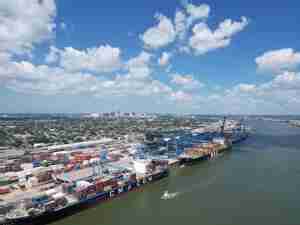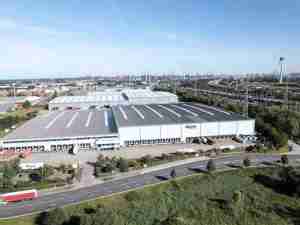Hans Smits, Port of Rotterdam Authority CEO: “The port of Rotterdam continues to perform well. Growth up so far equals that in 2007, when we spoke of a ‘sprint in the third quarter’, and this September was even better than last year. In comparison with the first six months, growth faltered, but that was the strongest period in the last ten years.
We are actually seeing signs of a change in our fortunes. There is a decline in the transshipment of feedstocks for the metal sector and chemical industry and also less growth in containers and roll on/roll off. This started in the first quarter and is related mainly to the slowdown in the world economy. When growth starts to falter in continental Europe, we are sure to notice that too. This has been delayed, however, and cushioned to some extent by the increased trade contacts with markets that are holding out better. We are also benefiting from structural investments made during the past ten years in the port and beyond, for example in the Betuwe Line. We therefore are sticking to our forecast of 4 to 5 % growth, to around 420 million tons. But for 2009 I expect a considerable slowdown in growth."
LIQUID BULK
The percentage growth in imports of crude oil (+7% to 76 million tons) is gradually falling as we approach the end of the year, parallel to the recovery of the transshipment capacity in 2007. In absolute quantities, throughput comes close to the maximum level achieved in practice of over 100 million tons.
The transshipment of mineral oil products (+1% to over 44 million tons) is more or less stagnant. The demand for heavy fuel oil in particular is not increasing, because shipping lines are sailing more economically in order to cut costs. The handling of other liquid bulk (+15.7% to 27 million tons) benefited in particular from the increasing demand for biofuels and vegetable oil. Chemical products did less well.
DRY BULK
Growth in the transshipment of agribulk (+26%) is falling gradually in the second half of the year, due to the good harvests in the EU during the 2008-2009 season. Not visible in sea/sea transshipment is a large quantity of cargo arriving by rail from Eastern Europe for transfer onto inland shipping.
Incoming trade in coal (+9% to almost 22 million tons) is flourishing, thanks to demand from Germany, where domestic production is declining both structurally and incidentally. In the fourth quarter, the growth will fall slightly in relative terms compared to the extremely good quarter in 2007.
Particularly large quantities of ores and scrap (+11% to 33 million tons) were handled, due to the high demand for steel and the expansion of production capacity in Duisburg and Liège. The last plant went into operation (again) in the fourth quarter of 2007 and therefore diminishes growth in the corresponding quarter. Besides this, production restrictions have now been announced. This results in an annual forecast of 42 million tons.
Half of the decline in the handling of other dry bulk, (–11% to 8.6 million tons) can be attributed to the loss of cargo packages. The other half is determined by economic trends. The transshipment of minerals has been under pressure since earlier in the year, due to falling demand from the chemical and metal industry. There is less call for building materials, sand and gra









